Nvidia Corp.
NVDA,
is doubling down on artificial-intelligence-powered drug discovery and development, announcing expanded partnerships Monday with Amgen Inc.
AMGN,
and Recursion Pharmaceuticals Inc.
RXRX,
Amgen subsidiary deCODE Genetics is building out an Nvidia supercomputer to create genomics “foundation models” — models trained on massive datasets to tackle a variety of jobs — to fuel drug discovery, Nvidia said Monday at the JPMorgan Chase & Co.
JPM,
healthcare conference in San Francisco.
Nvidia also announced Monday that its own generative-AI platform for drug discovery, BioNeMo, is now in beta testing and is being adopted by computer-aided drug-discovery players across the industry, including Recursion and Insilico Medicine. The platform’s computational methods help scientists lean on generative AI to cut down on experiments or even replace them altogether, Nvidia said.
The first third-party model available in BioNeMo will be a Recursion foundation model for drug discovery, Nvidia said.
“There is a very big moment happening in the world of pharmaceuticals and how drugs are being discovered,” Kimberly Powell, vice president of healthcare at Nvidia, said on a call with reporters Thursday. The $250 billion drug-discovery industry, she said, “is being reinvented with digital biology and generative AI.”
Momentum behind AI-powered drug discovery has been building as the pharmaceutical industry seeks to rein in the costly failure rate involved in traditional development of medicines. Roughly 90% of drug candidates that reach the clinical-trial stage fail, and for successful drugs, the path to the U.S. market typically takes 10 to 15 years and costs about $2.5 billion.
Major drugmakers inking AI-related deals in recent months include Novo Nordisk
NVO,
which in September announced a partnership with Valo Health Inc. focused on new cardiometabolic programs, and Roche Holding AG’s
RHHBY,
Genentech unit, which in November announced a research collaboration with Nvidia focused on AI-based drug discovery.
Yet questions remain about the potential for AI to improve the speed and efficiency of the drug-discovery process. Just as the chatbot ChatGPT sometimes fabricates answers, the equivalent problem in drug discovery could lead AI tools to “suggest substances that are impossible to make,” said an October editorial in the journal Nature. Such problems might be addressed by hand-coding knowledge of molecular structures, the journal said, and with the help of other AI tools.
Another challenge: To amass enough data for efficient AI-powered drug discovery, drug companies need to find a way to share information without sacrificing the competitive edge that comes with proprietary datasets, Amgen researchers wrote in a September paper published in Nature. One solution, the researchers wrote, could be a “federated learning” approach in which each company updates a shared model using datasets without sharing the underlying data.
The Recursion foundation model offered through BioNeMo focuses on translating images of human cells into mathematical representations of biology, Recursion CEO Chris Gibson said on the call with reporters. “We think this will become as big and exciting as genomics,” which involves the mapping and editing of genes, Gibson said.
“We want to advance the field, and we think that by sharing this foundation model, we’ll actually accelerate the sharing of other models,” Gibson said. “That will move all of us forward faster.”
But “there’s still a lot that we’re keeping proprietary,” he added, including over 50 petabytes of biological data that Recursion uses for internal programs and partnerships.
Read the full article here




